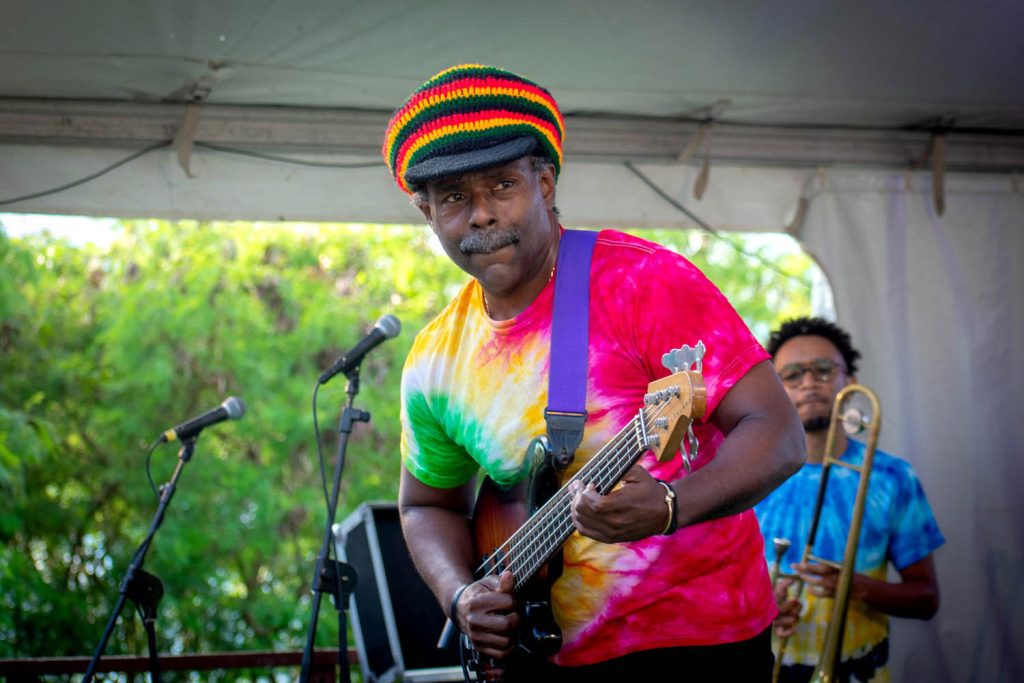Many may know Nicholas Brancker for his role in the spread of soca beyond its Trinidad & Tobago origins. But far beyond that, he has been a shining example of how Caribbean musicians can succeed both at home and abroad, holding their own against titans of the global music business.
With an impressive body of work and numerous accolades, his journey serves as a potential roadmap for Caribbean musicians seeking to sustain a successful music career in these islands (and beyond them). And yet, Brancker’s name is too seldom called in conversations about Caribbean musicians who have achieved excellence in the arts.
Born in England in August 1965 to a Bajan (Barbadian) father and Trinidadian mother, Brancker would return “home” as a child — first to Trinidad, then to Barbados when the family settled there permanently in 1970.
He was a prodigy. From age three, he was picking out melodies on a toy piano, before starting formal piano lessons at seven. “My interest in music is something I do not remember starting. It has always existed,” he told Caribbean Beat.
Despite his initial resistance to it, he acknowledges that formal training as necessary. Family was also integral to his musical beginnings. “I was very fortunate that both my parents loved music,” he says.
His mother was more musically experienced, coming from a family of musicians in church, while his father had come from a Bajan household that “was a little less tolerant of the artistic side”, and was self-taught.
Brancker’s first music lesson from his father was perhaps the most important, leaving a lasting impact that continues to inform every facet of his work: “You can make whatever you are doing your own, even if it has already been created,” he explains. “Every performance is me, in some way, diving into some artistic interpretation of something.”
His father’s love of the blues also impacted how Brancker saw Black music’s global impact, and the responsibility to “not lose sight of what music has always meant to us as a people,” he continues. “It’s not just a source of entertainment — it’s a spiritual source, a cultural source, an identity we use to propel ourselves through history.”
Brancker consequently listened deeply to a broad range of popular Caribbean and American recorded music over the years, developing a broad-based musical understanding. He also evolved from keyboardist to bassist during high school. “From the first time I saw a bass being played, I said, ‘I need to do that.’ I never actually taught myself,” he remembers. “I just picked it up and started to play.”
Still a teenager, he was already becoming well-established through numerous gigs and performances, including at the Battleground Calypso Tent in Barbados in 1984. There, he met Guyanese-British music legend Eddy Grant, impressing him enough that Grant asked Brancker (then a university student) to join him on his forthcoming world tour (1985–86). It was the chance of a lifetime.
“My only issue was, how am I breaking this to my parents?” Brancker recalls. “My line of reasoning was I could always go back to university, [but] I don’t know if I could get this shot again.” Though “unsettled” — especially his father — they let him go. And, in a full circle moment, the University of the West Indies awarded Brancker an honorary doctorate in 2021.
The first record production credit in Brancker’s extensive and varied catalogue was for an album by Bajan calypsonian Adonijah in 1984. His most recent was for an EP by trumpeter and singer Kweku Jelani in 2023. He’s also released two albums as leader — In Contempt (1996) and Touching Bass (2017). And, over four decades, he’s written, recorded, and/or produced a staggering number of songs — reportedly over 3,000.
“I make music because I have no choice,” he explains. “I have this inside fighting to come out. It is not for accolades.”
And yet, the accolades came, including two Grammy nominations in 1992 for Best Contemporary Jazz Song and Best Contemporary Jazz Performance (for “Love Is” by flautist Sherry Winston); the Barbados Service Star (1995) from the Barbadian government; and 18 Sunshine Awards between 1994 and 2002.
When soca star Red Plastic Bag eschewed Trinidadian producers for Brancker with his 1993 hit “Ragga Ragga”, it resulted in a flow of talent from Trinidad to Barbados
When soca star Red Plastic Bag eschewed Trinidadian producers for Brancker with his 1993 hit “Ragga Ragga”, it resulted in a flow of talent from Trinidad to Barbados seeking similar production. An industry of Bajan calypso and soca blossomed.
While spending a few months in Jamaica in 1994 working with Mikey Bennett — of “Telephone Love” (1988) and “Mr Lover Man” (1992) fame — Brancker heard no music with the frenetic pace of T&T’s soca. Studying the evolving science of acoustics and sound engineering, he learned not to clutter the clarity of the soundscape with competing frequencies, to minimise the instrumentation, and to allow the bass to pump. It formed a template for his new soca.
The result was a period marketed by T&T promoters as the infamous “Bajan invasion” in the mid-to-late 1990s, when the “groovy” tempo “ragga soca” music of Bajan bands krosfyah, Square One, and Coalishun dominated the radio airwaves and T&T’s carnival with hits like “Pump Me Up” (1994), “Turn it Around” (1997), and “Ice Cream” (1996). Brancker worked on all — either as a musician, arranger, or producer.
The response, after the initial burst of euphoria, was almost xenophobic — with Brancker being described as the “general of the Bajan invasion”. This perturbed him — especially since he was half Trinidadian. “This is not how I envisaged the Caribbean functioning,” he recalled.
Brancker takes a much broader view of Caribbean and global popular music. “I can understand the idea that the grass is greener on the other side, and when you are not in that space something can seem more attractive than it is … you begin to take [familiar things] for granted.
“But, in terms of the artistic contribution of Caribbean people to the world,” he emphasises, “I can’t think of another group of people who have done more per capita for music on the planet than us. It is a shame that we tend to view ourselves still as less than.”
That said, he does not discount his 12 years in Roberta Flack’s live touring band (2005–17) — the last three as associate musical director — nor his tenure with Eddy Grant who, Brancker says, was “unapologetically Caribbean, but still African in substance”. It greatly impacted Brancker’s world view, and his evolution as an artist.
Brancker’s focus now is on live performance, and he’s looking to establish “a more year-round, artistically sustainable mode of expression” with his new Nicholas Brancker Band. His Uplift: a Caribbean Fusion Concert last March is a recent example. With a goal of touring in the future, they’re looking at collaborations with small orchestras in Europe.
He’s also invested in fostering younger generations — helping them develop better knowledge of self, of history, and of their craft, their instrument(s), and their context in the world.
“I can’t think of another group of people who have done more per capita for music on the planet than us. It is a shame that [Caribbean people] tend to view ourselves still as less than”
“I take my musical gifts very seriously. The older I get, the more important it becomes to see a sense of strength and confidence and awareness of position in younger musicians,” he says. “They do not stand with their chest up in international environments. They don’t respect themselves in that way, because they feel that somebody else is better than them … But all that is different is the taste, not the standard of execution.”
Unsurprisingly, it’s important for him to help younger artists understand that what Caribbean musicians bring can’t be duplicated by others. It’s about authenticity, for Brancker: a belief reinforced by a lifetime of international experience and a sensibility rooted in the Caribbean.
“You can only have influence artistically if you are authentic. I cannot assess positively anybody who carbon copies anything. The more varied your experiences are, the more you can bring to bear on what you are doing,” Brancker says. “The other thing is we need more voices in music creation in the English-speaking Caribbean … We limit ourselves, and I would like to think my voice has a value, and gives a wider breadth of what our expression can be.”
This is not arrogance, but confidence. With an award-winning and commercially significant body of work, Nicholas Bracker is still composing and performing new music, and developing and mentoring a new cadre of young musicians. He is a legacy-maker in his own time. Soca music is now Caribbean music, and we can thank Brancker for that.

